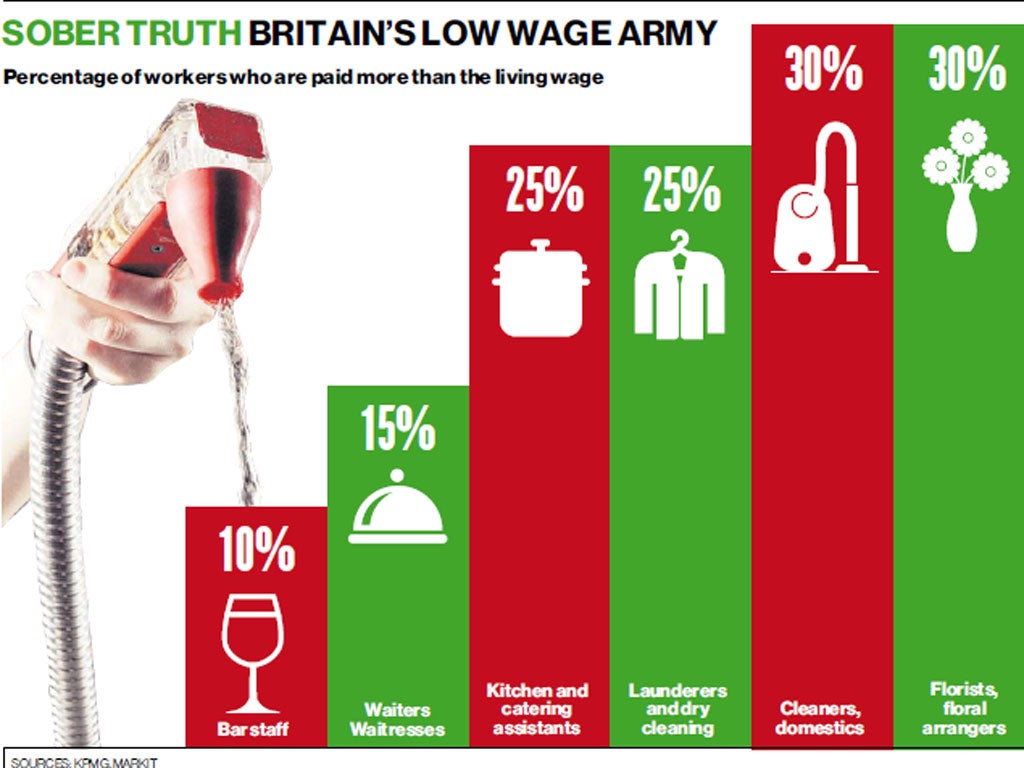Scandal of 5m on less than the living wage
Shock study reveals that 4.8m people earn too little to meet basic standards

Britain's worst double-dip recession since the 1950s has left a fifth of all workers struggling to get by on less than the living wage, a major report to be published today will reveal.
Almost five million workers are being paid less than the amount considered necessary to afford a basic standard of living – £8.30 an hour in London, and £7.30 outside the capital.
Care workers, bar staff, waiters and retail staff on low incomes have been hit hardest by the downturn, the report, commissioned by accountancy firm KPMG, found.
The research is being published ahead of Living Wage Week, which starts on November 4 and will see new rates announced for London and the rest of the country.
A number of employers have voluntarily adopted the independently calculated standards, which compare with the statutory national minimum wage of just £6.19 an hour.
But that has been dismissed as hopelessly inadequate by campaigners, who report low-paid workers across Britain are bearing the brunt of a brutal double-dip recession that has been characterised by a squeeze on incomes combined with rising taxes and high levels of inflation.
The study, carried out by Markit on behalf of accountancy giant KPMG, reported bar staff, restaurant workers, catering and retail staff had been worst affected by the downturn. Official figures showed that the UK economy roared back in the last quarter, surprising economists with growth of 1 per cent after a bleak first half of the year.
But any benefits are evading those earning low incomes in the UK, the report showed, with four in 10 low-paid workers admitting their finances are worse now than they were just a month ago. That compared with just 25 per cent of workers on incomes above the level. By proportion of the population, Northern Ireland has the highest level of people earning wages beneath the living wage level, closely followed by Wales (23 per cent). London and the North West are the highest by number with 570,000 each.
Some 38 per cent of respondents below the living wage say they have poorer cash availability now than a month ago, compared with 27 percent of those earning above, indicating that the recovery is failing to benefit those most in need.
TUC general secretary-designate Frances O'Grady called on companies to adopt the standard describing the figure of one in five workers surviving below it as "shocking".
She added: "The living wage is not a luxury, and means that low-paid workers don't have to make tough choices over whether they can afford the everyday things that most of us take for granted, such as their fuel bill or a winter coat for their children," she said. "Now more than ever is the time for employers to put an end to poverty pay."
Rhys Moore, director of the Living Wage Foundation, said: "Paying a living wage makes a huge difference to the quality of life of thousands of cleaners, caterers and security staff across the country. It is encouraging to see nearly 100 organisations now signed up and accredited. But that still leaves many more organisations that aren't."
Marianne Fallon, head of corporate affairs at KPMG, said there were sound business reasons for adopting the standard including "improved motivation and performance" together with "lower leaver and absentee rates among staff in receipt of a living wage" offsetting the extra costs of paying it.
Subscribe to Independent Premium to bookmark this article
Want to bookmark your favourite articles and stories to read or reference later? Start your Independent Premium subscription today.

Join our commenting forum
Join thought-provoking conversations, follow other Independent readers and see their replies